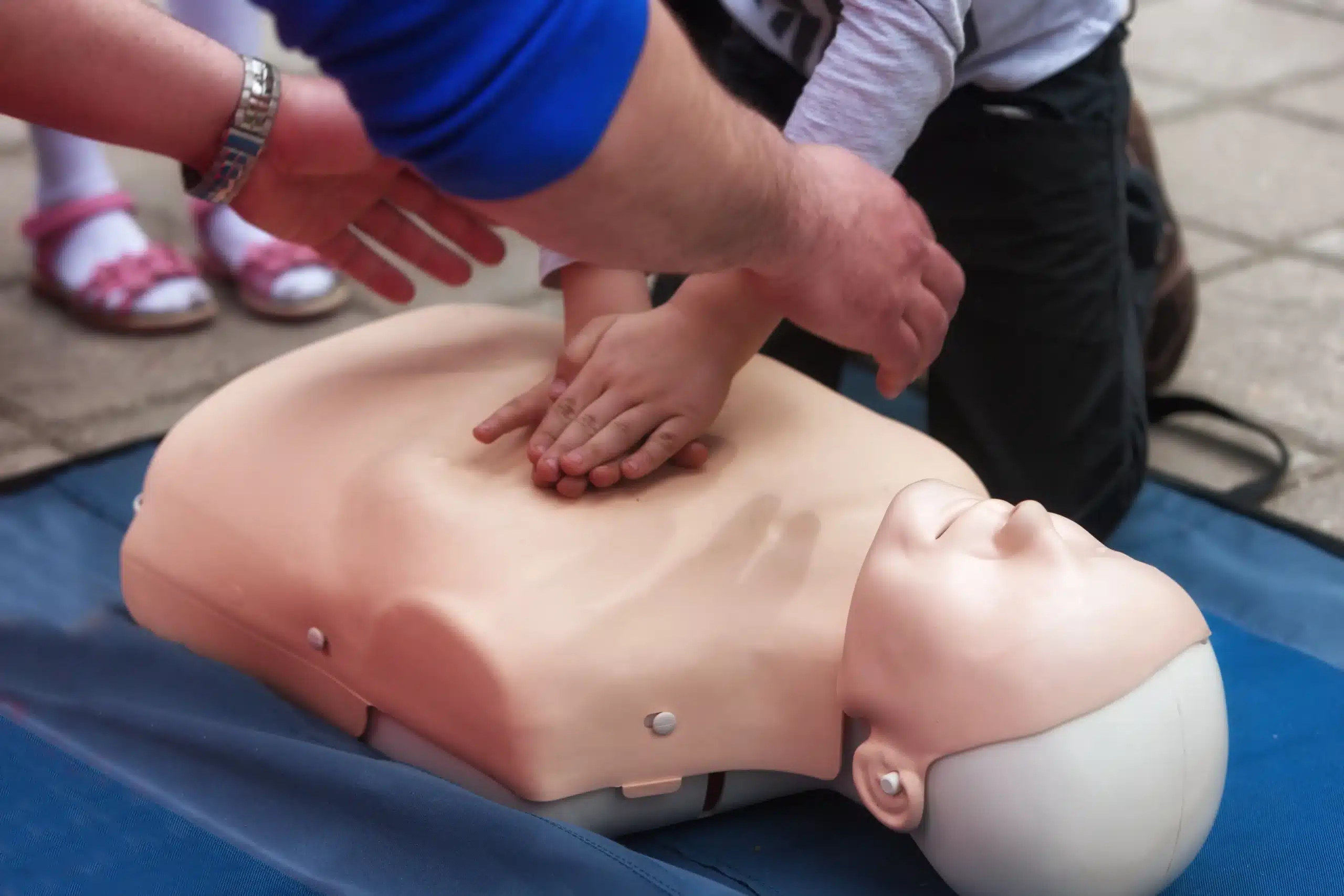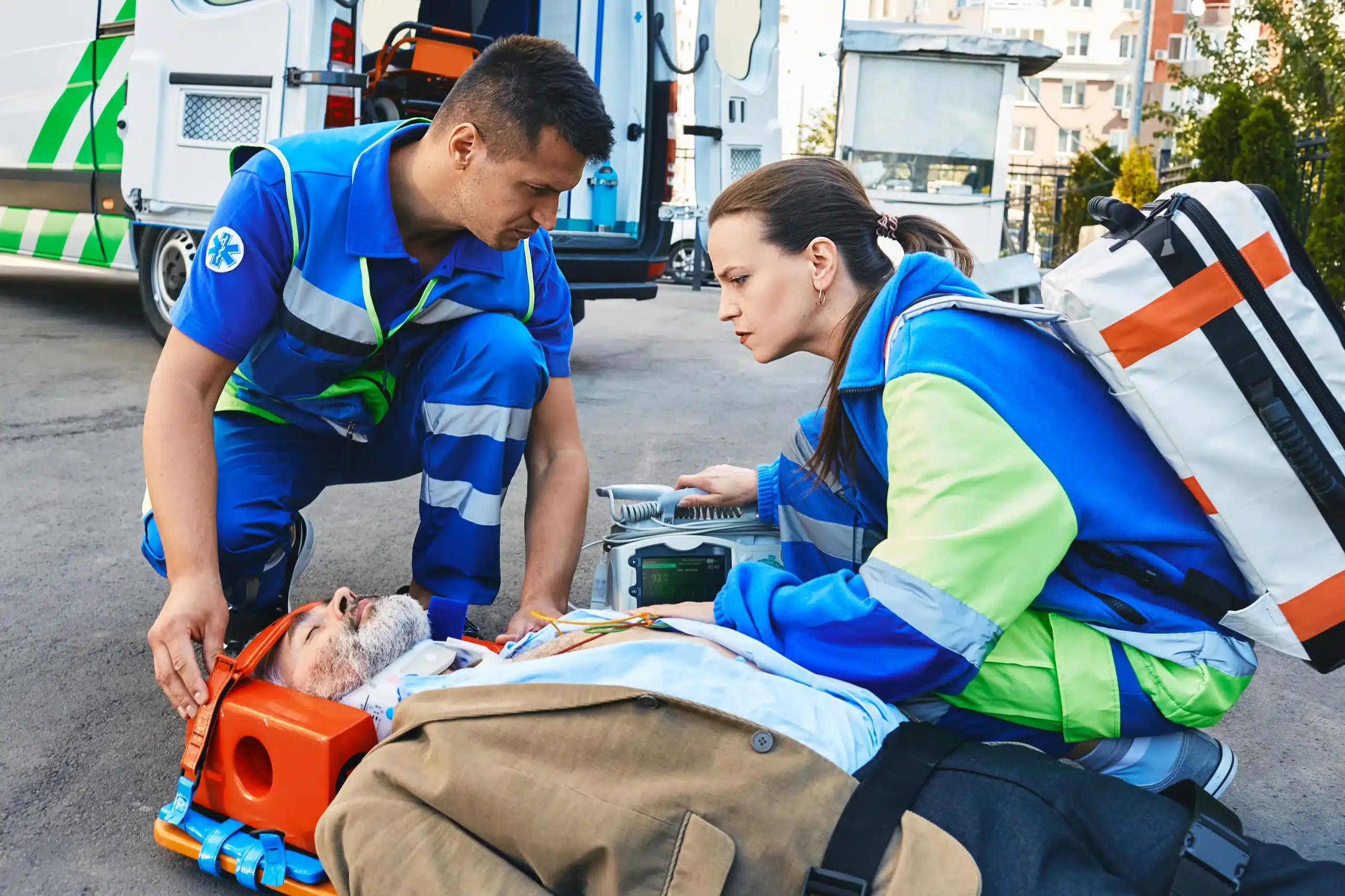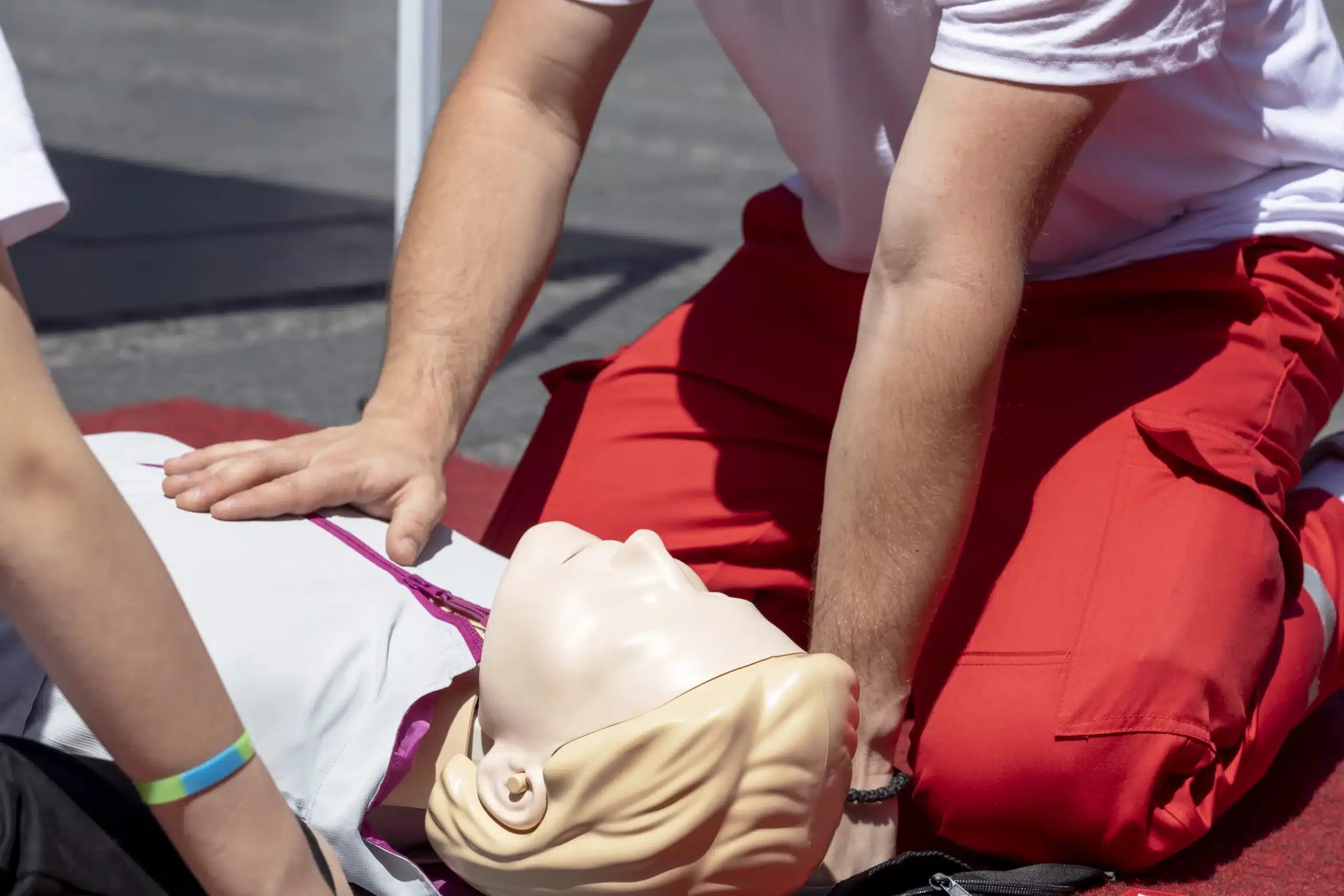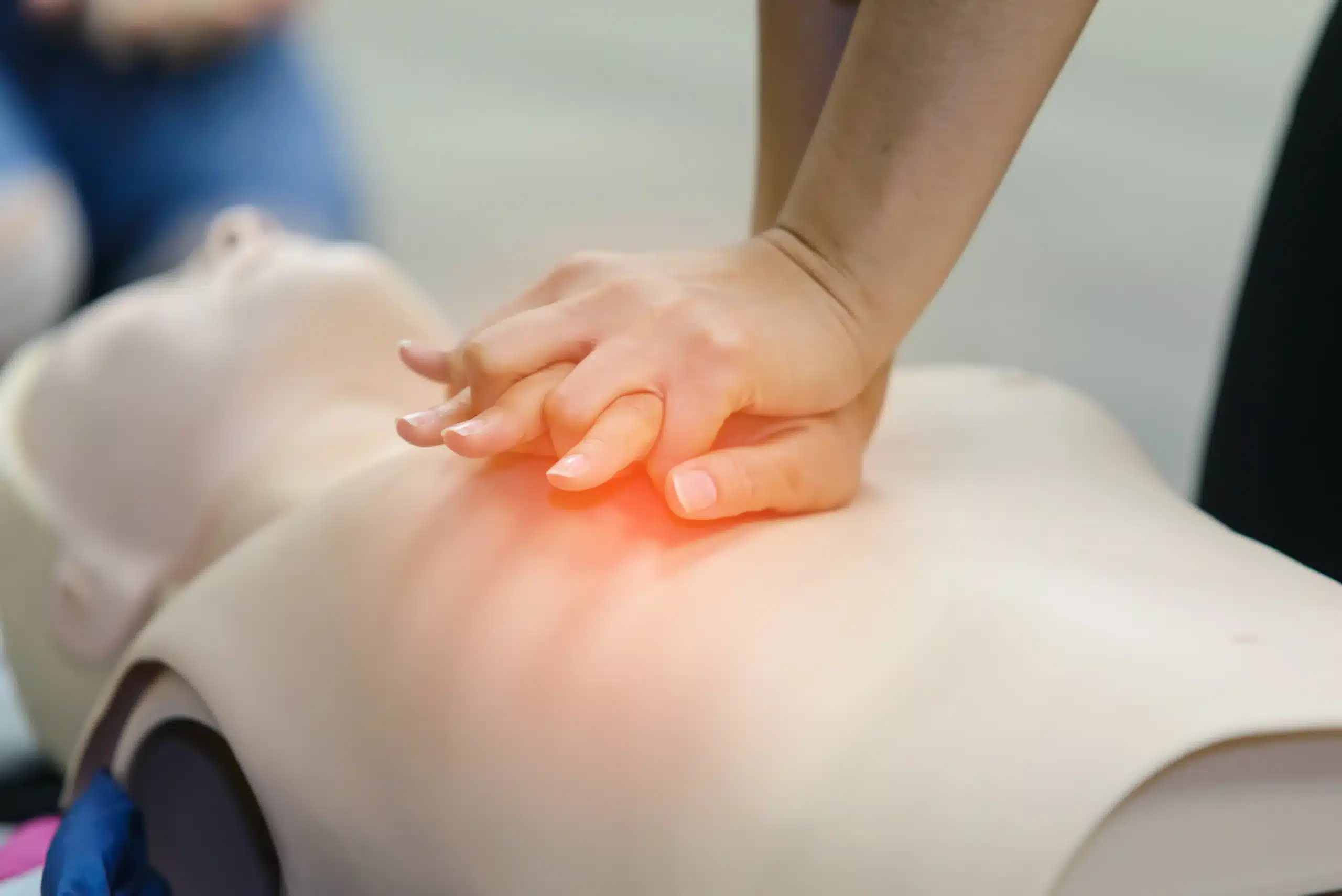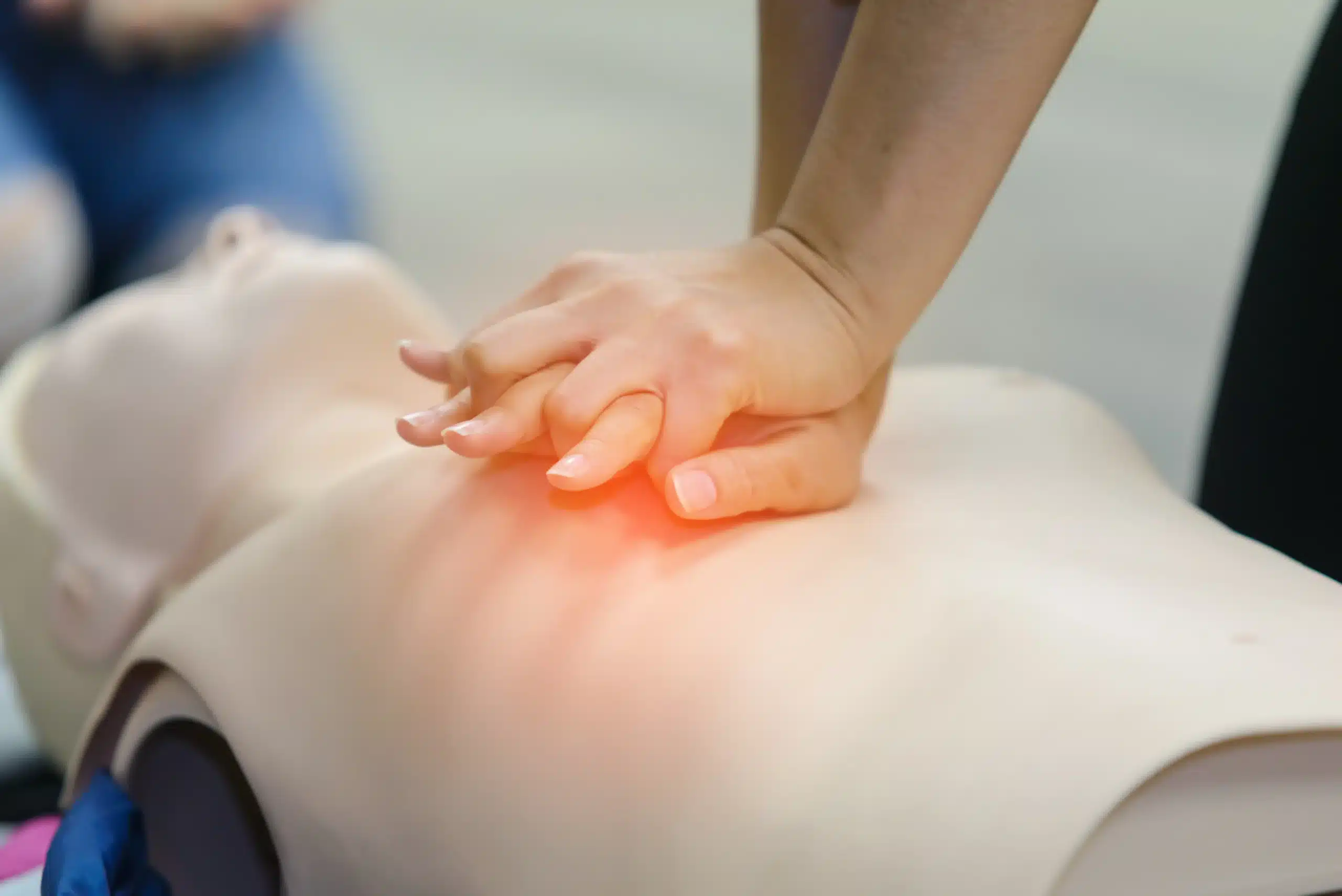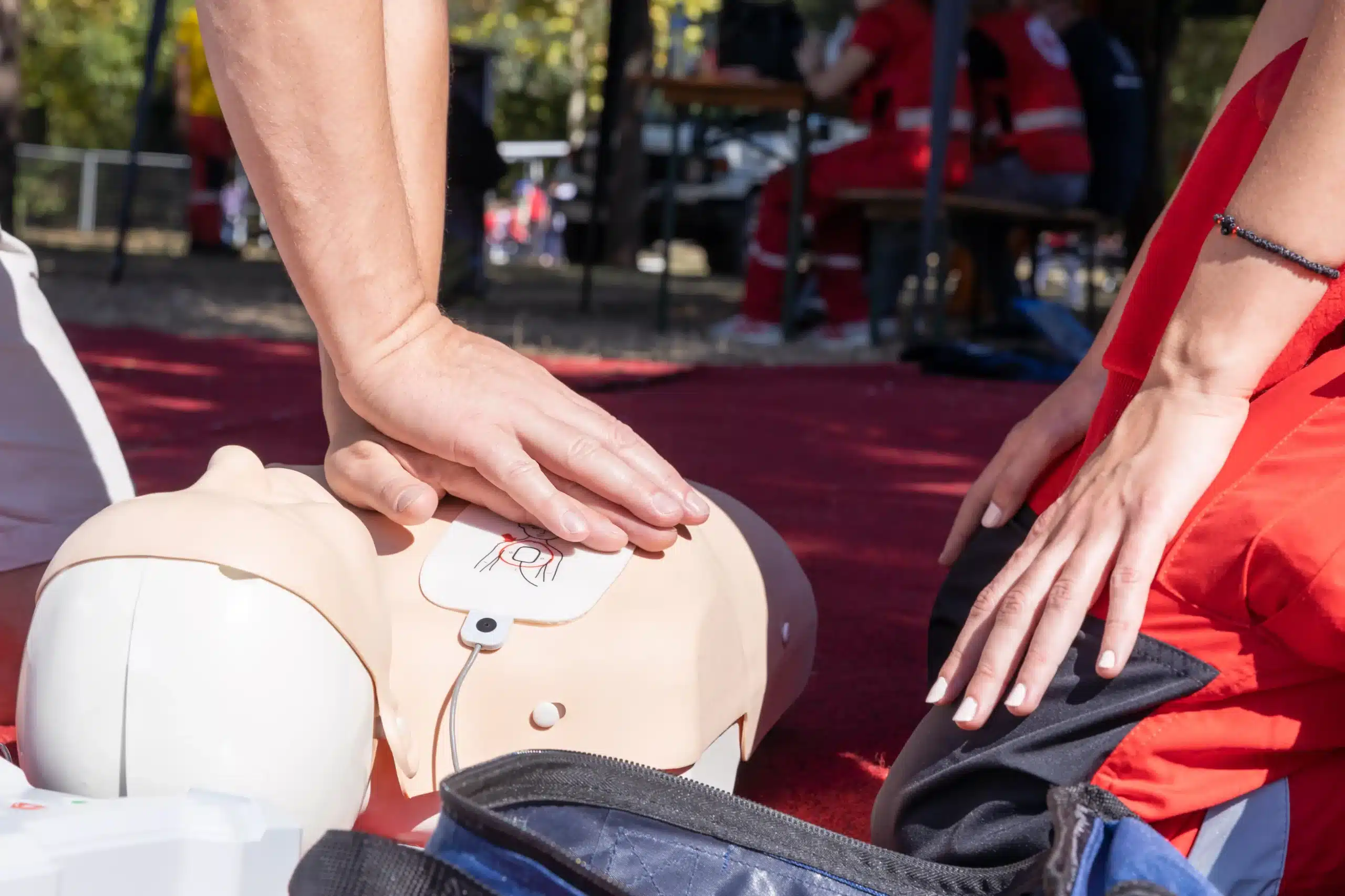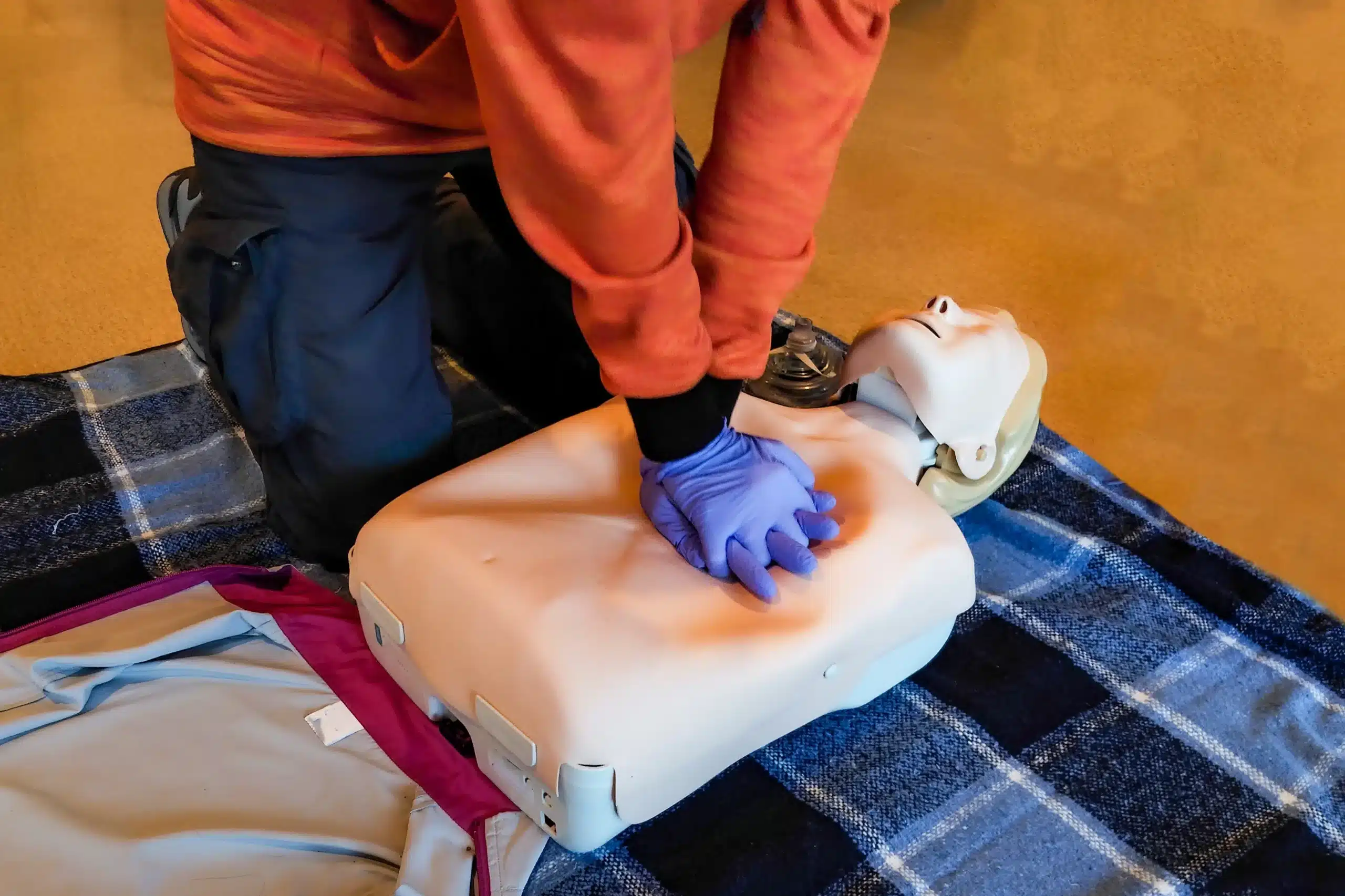Empower yourself with the life-saving skills of CPR. This guide is your one-stop resource for everything related to CPR certification in Menlo Park. We’ll cover the essential aspects of CPR training, including the different certification levels, course formats, and costs. You’ll also find valuable information on where to find CPR certification in Menlo Park, including reputable providers like Safety Training Seminars, Menlo Fire CERT, and the American Red Cross. Whether you’re seeking CPR certification in Menlo Park for professional reasons or personal preparedness, this guide will provide you with the knowledge and resources you need to make an informed decision.
Key Takeaways
- CPR certification empowers you to save lives: Whether you’re a healthcare provider, a parent, or simply want to be prepared, CPR training provides the skills to respond effectively in emergencies. Explore various certification levels and course formats to find the best fit.
- Find the right CPR class in Menlo Park: Consider factors like the type of certification offered (AHA, Red Cross), course format (in-person, blended learning), and schedule to choose a class that meets your needs and learning style. Compare local providers like Safety Training Seminars, Menlo Fire CERT, and the American Red Cross.
- Stay current with your CPR skills and certification: Maintain your skills and knowledge by renewing your certification every two years. Regular practice and continuing education ensure you’re always prepared to confidently handle emergencies.
What is CPR Certification in Menlo Park?
CPR certification in Menlo Park equips you with the life-saving skills to respond to cardiac arrest and other medical emergencies. It’s a crucial step towards ensuring the safety and well-being of your community, whether you’re a medical professional, a concerned parent, or simply someone who wants to be prepared. This certification validates your ability to perform chest compressions, rescue breaths, and other essential techniques that can significantly improve a person’s chances of survival.
Several organizations offer comprehensive CPR training in Menlo Park, providing various certification levels and course formats. These courses cover essential techniques, including recognizing the signs of a heart attack, providing appropriate first aid, and using an AED. By becoming CPR certified, you gain the confidence and competence to act quickly and effectively in emergencies.
For those seeking American Heart Association (AHA) certified training, providers like Safety Training Seminars offer courses in BLS, ACLS, and PALS, ensuring you receive nationally recognized credentials. Explore the options available in Menlo Park and take the first step towards becoming a vital link in the chain of survival.
CPR Certification Types
American Heart Association (AHA) Certifications
The American Heart Association (AHA) offers various CPR and first-aid certification courses tailored to different needs. These courses equip you with the skills to respond effectively in emergencies, whether you’re a healthcare professional or someone wanting to help your community. At Safety Training Seminars, our AHA certifications include Basic Life Support (BLS) and Advanced Cardiovascular Life Support (ACLS). Each program focuses on specific life-saving techniques and emergency care. We also offer RQI courses through the AHA.
Basic Life Support (BLS) Certification
BLS Certification is fundamental for healthcare providers and anyone who needs to know CPR. This course covers essential skills like chest compressions, airway management, and using an AED. It prepares you to respond to cardiac emergencies in various settings. The AHA offers BLS courses in different formats, making them accessible to diverse learning styles.
Advanced Cardiovascular Life Support (ACLS) Certification
ACLS Certification expands on the skills learned in BLS and is designed for healthcare professionals who respond to cardiovascular emergencies. ACLS training includes advanced interventions like defibrillation, medication administration, and managing cardiac arrest and other cardiovascular conditions. This course is vital for professionals in emergency rooms, intensive care units, and other critical care settings.
Pediatric Advanced Life Support (PALS) Certification
PALS Certification focuses on the emergency care of infants and children. While we don’t currently offer PALS certification at Safety Training Seminars, we encourage you to explore other providers for this important training. Our focus remains on providing high-quality, affordable BLS and ACLS training in the Menlo Park area.
Where to Find CPR Certification in Menlo Park
Finding the right CPR certification course that fits your schedule and learning style is easy in Menlo Park. Here are a few reputable options:
Safety Training Seminars
Safety Training Seminars offers a comprehensive range of CPR and First Aid certifications, including AHA certifications such as BLS, ACLS, PALS, and CPR. They also provide courses like the American Academy of Pediatrics (AAP) NRP and EMSA certifications for childcare providers. With over 45 locations across Northern California, including classes in Palo Alto, Redwood City, and Menlo Park, finding a convenient location is simple. If your schedule is tight, their instructors can also travel to your office or school in Menlo Park. For a blended learning approach, Safety Training Seminars offers the RQI program, combining online learning with in-person skills sessions. With daily classes, fitting training into your busy life is easier. You’ll receive your AHA certification card, valid for two years, on the same day you complete the course.
Menlo Fire CERT
The Menlo Fire CERT program prepares community members to handle medical emergencies until professional help arrives. Their seven-hour CPR and First Aid training takes place the first Saturday of each month at the Arrillaga Family Recreation Center in Menlo Park.
American Red Cross
The American Red Cross offers CPR training and certification throughout California, including in Menlo Park. They provide flexible learning formats, with in-person, online, and blended learning classes. In-person classes include hands-on practice and lead to a two-year certification that meets OSHA workplace safety standards.
Arrillaga Family Recreation Center
The Arrillaga Family Recreation Center, at 700 Alma St, Menlo Park, hosts various community programs, including CPR certification classes. While they don’t offer courses directly, they frequently host training sessions by organizations like Menlo Fire CERT. Check the recreation center’s website for upcoming CPR class information.
CPR Certification: Costs & Value
Getting CPR certified is an investment in yourself and your community. But how much does it cost, and what value do you receive? Let’s break down the pricing and explore why CPR training is a worthwhile investment.
Individual Class Pricing
CPR certification classes have different price points depending on the level of certification. A basic CPR course will typically be less expensive than more advanced certifications like ACLS or PALS. Safety Training Seminars offers various courses, from basic CPR training to specialized certifications like BLS. Visit their website for current pricing information.
Group Discounts and Special Rates
Training a group? Safety Training Seminars offers discounts for groups like workplaces or community organizations. This can be a budget-friendly way to get everyone certified together. Contact them to discuss your group’s needs and receive a personalized quote.
Low Price Guarantee Options
Safety Training Seminars provides high-quality training at competitive prices. They also have a low price guarantee, ensuring you receive excellent value. This commitment makes life-saving skills accessible to all.
Class Formats & Duration
Finding the right CPR class format is key to successful learning. Whether you thrive in a hands-on environment or prefer the flexibility of online learning, various options cater to different learning styles and schedules. Let’s explore the different formats available for CPR certification in Menlo Park.
In-Person Training
In-person CPR training offers a structured, immersive experience. These classes provide direct interaction with certified instructors and fellow students, creating a supportive learning environment. You’ll have the opportunity to ask questions, receive immediate feedback, and practice your skills on mannequins. For those in Menlo Park, the Menlo Fire CERT provides in-person CPR and First Aid training, typically held on the first Saturday of each month. Safety Training Seminars also offers in-person training with the convenience of daily classes in over 60 cities.
Online and Blended Learning Options
Online and blended learning formats offer increased flexibility for busy schedules. Fully online courses allow you to learn at your own pace, accessing materials and completing modules from anywhere with an internet connection. Blended learning combines online modules with in-person skills sessions, offering a balance of flexibility and hands-on practice. The American Red Cross offers various CPR training formats, including online and blended learning, allowing you to choose the best fit for your needs.
Typical Course Lengths and Schedules
CPR and First Aid courses vary in length depending on the specific certification and provider. The standard course offered by Menlo Fire CERT typically lasts about seven hours. Safety Training Seminars offers a range of courses, including BLS and ACLS certifications, with varying durations to accommodate different requirements. Check with your chosen provider for specific course schedules and durations. Many providers offer weekend and evening classes to accommodate busy schedules.
What Happens During CPR Training?
CPR training equips you with the skills to respond effectively during medical emergencies. It’s a blend of knowledge, hands-on practice, and assessment, all designed to prepare you to confidently provide assistance when needed.
Course Content and Skills Covered
CPR classes cover essential life-saving techniques. You’ll learn how to recognize the signs of a cardiac arrest, when to call 911, and how to deliver chest compressions and rescue breaths. Many courses also integrate training on using an automated external defibrillator (AED) and basic first aid. This comprehensive approach ensures you’re prepared for various emergency scenarios. For example, the Menlo Fire CERT program emphasizes citizen response to cardiac, breathing, and first aid emergencies until professional help arrives. You can find comprehensive CPR training, including AED and first aid instruction, at Safety Training Seminars.
Hands-On Practice Sessions
Hands-on practice is the cornerstone of effective CPR training. You’ll work with training manikins to practice chest compressions, rescue breaths, and AED use in a safe and controlled environment. These sessions allow you to develop muscle memory and build confidence in your abilities. Programs like those offered by the American Red Cross often align their practical training with workplace safety standards (OSHA). This hands-on experience is invaluable in translating classroom knowledge into real-world action.
Assessment and Certification Process
After completing the training, you’ll be assessed to ensure you’ve mastered the necessary skills. This typically involves demonstrating CPR techniques on a manikin. Upon successful completion, you’ll receive your CPR certification. Organizations like the American Heart Association (AHA) offer certifications, often providing certification cards the same day. This certification is usually valid for two years, after which you’ll need to renew your certification to stay current. You can find information on CPR certification classes in Menlo Park through resources like Bay Area CPR.
Certification: Validity & Renewal
How Long is Certification Valid?
Your American Heart Association (AHA) certification card is valid for two years. You receive your card the same day you complete the course. This two-year timeframe ensures you’re up-to-date on the latest CPR techniques and guidelines. Knowing your certification period helps you plan for renewal and maintain your qualifications. For more details about our courses, take a look at our CPR certification classes in Menlo Park.
Renew Your Certification
CPR certifications from the American Red Cross, much like AHA certifications, are also valid for two years. It’s important to renew your certification before it expires to keep your skills sharp and ensure you meet any workplace requirements. Staying current with your certification demonstrates your commitment to providing high-quality CPR. Visit our website to learn more about renewing your CPR certification.
Keep Your Skills Current
Even if your certification lapses, don’t hesitate to act in an emergency. The CDC still recommends providing assistance. However, renewing your certification is always the best approach. It keeps you familiar with the most recent guidelines and techniques, giving you the confidence to respond effectively. Regularly refreshing your skills makes you a more valuable asset in emergencies. Consider exploring our RQI classes to stay at the forefront of CPR knowledge and maintain your skills.
Choose the Right CPR Provider in Menlo Park
Finding the right CPR class can feel overwhelming, but focusing on a few key factors can simplify your search. Whether you’re a healthcare provider, a parent, or simply someone who wants to be prepared, choosing a reputable provider is essential.
Factors to Consider
First, think about the types of emergencies you want to be prepared for. CPR training focuses on cardiac and breathing emergencies, but many courses also cover other first aid emergencies. Decide if you need a basic course or more advanced training. Also, consider the certification. AHA certification cards are valid for two years and are typically provided upon completion of the course. Finally, think about logistics. Look for classes offered at convenient times and locations to accommodate your schedule.
Compare Local Options
Several organizations offer CPR certification in Menlo Park. Safety Training Seminars provides American Heart Association (AHA) certifications in BLS, ACLS, PALS, and CPR, with classes available at over 45 locations throughout Northern California or at your Menlo Park office or school. The American Red Cross also offers CPR training and certification classes throughout California. For more localized training, consider Menlo Fire CERT.
Unique Features of Menlo Park Providers
Each provider has unique offerings. Menlo Fire CERT holds classes the first Saturday of each month. Safety Training Seminars offers the RQI program, a popular option for medical professionals seeking efficient recertification. American Red Cross in-person classes include hands-on practice and lead to a two-year certification that meets OSHA workplace safety standards. Consider these distinctions when making your choice.
Benefits of CPR Certification
Getting CPR certified offers a range of advantages, both personal and professional, while also contributing to a safer community. Knowing you can potentially save a life brings a sense of empowerment and confidence.
Personal and Professional Advantages
CPR certification is a valuable asset in many professions. For those in healthcare, maintaining current certifications is often a job requirement. But CPR training benefits other fields too. Childcare providers, teachers, coaches, and personal trainers gain essential skills to respond to emergencies and ensure the safety of those in their care. Even outside of professional requirements, having CPR certification demonstrates a commitment to safety and preparedness, which can be a real advantage. It can even make you a more desirable candidate for certain jobs. Plus, knowing you have the skills to potentially save a life brings a sense of personal empowerment.
Community Impact and Safety
Learning CPR empowers you to make a real difference in your community. Community CPR training programs address a critical need by equipping people to handle medical emergencies until professional help arrives. This immediate response can significantly improve outcomes in time-sensitive situations. The American Red Cross emphasizes that CPR is a valuable life skill, and the more people in a community who are trained, the safer that community becomes. By getting certified, you become a vital link in the chain of survival, contributing to a more prepared and resilient community. Affordable training makes these life-saving skills accessible to everyone.
Prepare for Your CPR Class
Getting ready for your CPR class doesn’t require a ton of prep, but a little planning can make your experience smoother and more productive. Here’s what you should know:
What to Bring
CPR classes are primarily hands-on, so comfortable clothing is key. Think athletic wear or something you can easily move in. You won’t need to bring much else, but a notebook and pen can be helpful for jotting down notes. If you prefer taking notes digitally, a tablet or laptop can work, too. Just check with your chosen CPR provider—like Safety Training Seminars—about their policy on electronic devices in the classroom.
Pre-Course Study Materials
While pre-course study isn’t usually mandatory for CPR certification, familiarizing yourself with basic concepts can give you a head start. Many organizations, such as the American Heart Association, offer online resources that introduce core CPR techniques and the use of an AED. Reviewing these materials can boost your confidence before class.
Physical Requirements and Considerations
CPR classes involve physical activity, including performing compressions on a manikin. While you don’t need to be an athlete, a reasonable level of fitness is helpful. If you have any physical limitations or concerns, discuss them with your instructor before class. They can offer modifications or suggestions to ensure you can fully participate and learn effectively. Remember, the goal is to build skills and confidence in a supportive environment. In-person training often leads to a two-year certification that meets workplace requirements.
Related Articles
- CPR Renewal in Menlo Park: Your Guide – Palo Alto CPR Classes
- Pediatric Advanced Life Support (PALS) in Menlo Park – Palo Alto CPR Classes
- First Aid Training in Menlo Park: A Practical Guide – Palo Alto CPR Classes
- NRP Courses in Menlo Park: A Comprehensive Guide
Frequently Asked Questions
What are the different types of CPR certification available near Menlo Park?
The American Heart Association (AHA) offers several levels of CPR certification, including BLS (Basic Life Support) for healthcare providers and anyone needing CPR knowledge, and ACLS (Advanced Cardiovascular Life Support) for healthcare professionals responding to cardiovascular emergencies. While PALS (Pediatric Advanced Life Support) isn’t currently offered by Safety Training Seminars in Menlo Park, other providers in the area may offer this specialized training for infant and child emergency care. You can also find CPR and First Aid training through organizations like the American Red Cross and Menlo Fire CERT.
How much does CPR certification cost, and are there any discounts?
Costs vary depending on the certification level and provider. Basic CPR courses are generally less expensive than advanced certifications like ACLS. Safety Training Seminars offers competitive pricing and a low price guarantee. They also provide group discounts for workplaces or community organizations, making it more affordable to train multiple people at once. Contact individual providers for specific pricing details.
What can I expect during a CPR training class?
CPR training combines classroom instruction with hands-on practice. You’ll learn how to recognize cardiac arrest, perform chest compressions and rescue breaths, and use an AED. Most classes also include basic first aid training. You’ll practice these skills on manikins in a safe environment and receive feedback from certified instructors. After completing the course and passing an assessment, you’ll receive your certification card.
How long is my CPR certification valid, and how do I renew it?
AHA CPR certifications are typically valid for two years. It’s essential to renew your certification before it expires to maintain your skills and meet any workplace requirements. Check with your certifying organization for renewal options and procedures. Even if your certification has lapsed, remember that providing CPR in an emergency is still encouraged.
What if I have physical limitations? Can I still take a CPR class?
Absolutely! While CPR involves physical activity, instructors can adapt the training to accommodate various physical limitations. Discuss any concerns with your instructor before class, and they can offer modifications or suggestions to ensure you can fully participate and learn effectively.
